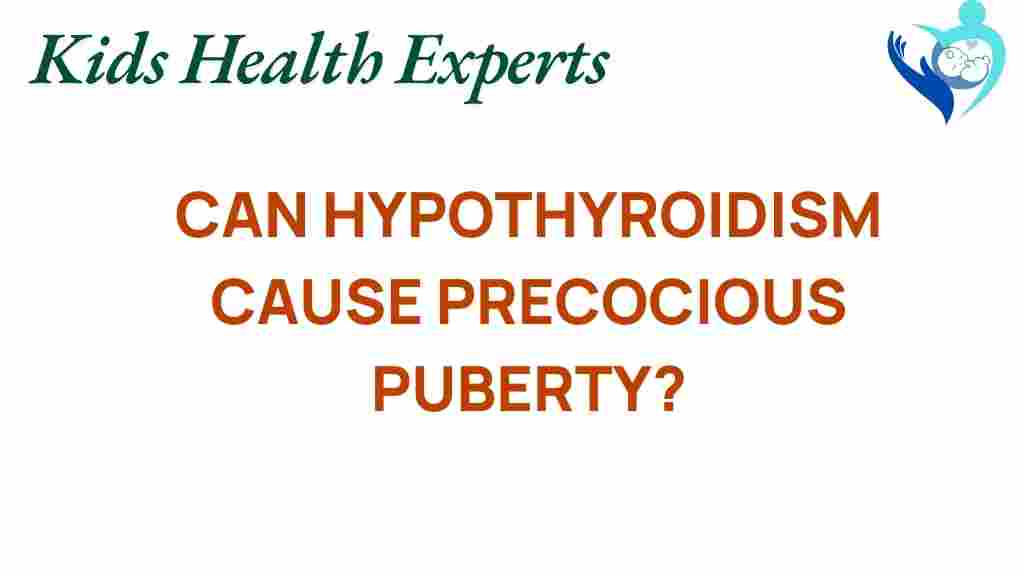Unraveling the Link: Can Hypothyroidism Trigger Precocious Puberty?
Hypothyroidism is a condition that occurs when the thyroid gland doesn’t produce enough thyroid hormones, affecting various bodily functions, including metabolism and growth. Precocious puberty refers to the onset of secondary sexual characteristics before the age of 9 in boys and 8 in girls. The interplay between hypothyroidism and precocious puberty raises important questions about thyroid health, endocrine disorders, and overall child development. In this article, we will delve into the relationship between these two conditions, explore relevant medical research, and provide insights on managing hormonal imbalance in pediatric health.
Understanding Hypothyroidism
Hypothyroidism is classified into two main types: primary and secondary. In primary hypothyroidism, the thyroid gland itself is damaged, whereas secondary hypothyroidism occurs due to problems with the pituitary gland or hypothalamus. Common causes of hypothyroidism include:
- Autoimmune disorders (e.g., Hashimoto’s thyroiditis)
- Thyroid surgery
- Radiation therapy
- Certain medications
- Iodine deficiency
Symptoms of hypothyroidism can vary widely, especially in children, and may include:
- Fatigue and lethargy
- Weight gain
- Cold intolerance
- Constipation
- Delayed growth and development
The Basics of Precocious Puberty
Precocious puberty can be classified into two categories:
- Central precocious puberty (gonadotropin-dependent): This type is caused by the premature activation of the hypothalamic-pituitary-gonadal axis, leading to the early release of sex hormones.
- Peripheral precocious puberty (gonadotropin-independent): This occurs when sex hormones are produced from sources other than the pituitary gland, such as tumors or hormonal imbalances.
Symptoms of precocious puberty may include:
- Development of breast tissue in girls
- Menstruation at an early age
- Enlargement of the testicles in boys
- Growth spurts
- Body odor and acne
The Connection Between Hypothyroidism and Precocious Puberty
Recent medical research has begun to explore the connection between hypothyroidism and precocious puberty. While the link is not fully understood, several theories suggest potential mechanisms:
- Hormonal Imbalance: Hypothyroidism can lead to an imbalance in various hormones, including sex hormones. This imbalance may trigger early sexual development.
- Thyroid Hormones and Puberty: Thyroid hormones are known to play a role in growth and development, as well as in the timing of puberty. Their deficiency may disrupt the normal timing of sexual maturation.
- Impact on Growth Hormones: Hypothyroidism can also affect growth hormone levels, which may contribute to the early onset of puberty.
Medical Research Findings
Several studies have investigated the relationship between hypothyroidism and precocious puberty:
- A study published in the Journal of Clinical Endocrinology & Metabolism found that girls with hypothyroidism were more likely to experience early signs of puberty compared to those with normal thyroid function.
- Another research indicated that thyroid hormone replacement therapy could have a positive effect on delaying the onset of precocious puberty in affected children.
- Some endocrinologists believe that the treatment of hypothyroidism may help manage precocious puberty, but further studies are required to establish definitive conclusions.
Step-by-Step Process: Managing Hypothyroidism and Precocious Puberty
Managing hypothyroidism and its potential link to precocious puberty involves a comprehensive approach:
1. Diagnosis
The first step is to obtain an accurate diagnosis. This may include:
- Blood tests to measure levels of thyroid hormones (T3, T4) and Thyroid Stimulating Hormone (TSH).
- Assessment of growth patterns and the onset of pubertal signs.
- Imaging studies, if necessary, to rule out structural abnormalities in the thyroid or pituitary gland.
2. Treatment of Hypothyroidism
If diagnosed with hypothyroidism, treatment may involve:
- Thyroid hormone replacement therapy (e.g., levothyroxine) to restore normal hormone levels.
- Regular monitoring of thyroid function to adjust medication dosages as needed.
3. Monitoring Growth and Development
Children with hypothyroidism should be closely monitored for:
- Growth patterns and height percentiles.
- Onset of sexual characteristics.
- Overall well-being and development.
4. Addressing Precocious Puberty
For children experiencing precocious puberty, management may include:
- Referral to a pediatric endocrinologist for specialized care.
- Consideration of medications to halt the progression of puberty if necessary.
- Support for emotional and psychological health, as early puberty can be challenging for children.
Troubleshooting Tips for Parents
Parents play a crucial role in monitoring their child’s health. Here are some troubleshooting tips:
- Keep a growth chart to track your child’s height and weight regularly.
- Observe for any early signs of puberty, such as breast development or changes in body odor.
- Encourage open communication with your child about their feelings regarding any physical changes.
- Stay informed about thyroid health and its impact on child development by consulting reliable sources and healthcare providers.
When to Seek Medical Help
It’s essential to consult a healthcare provider if you notice:
- Unexplained changes in growth or development.
- Signs of hypothyroidism, such as fatigue or weight gain.
- Early onset of sexual characteristics.
Conclusion
The relationship between hypothyroidism and precocious puberty is complex and still under investigation. While some medical research indicates a possible link, more studies are needed to establish causation definitively. Maintaining optimal thyroid health is crucial for child development, and parents should be vigilant about any signs of hormonal imbalance. By ensuring timely diagnosis and treatment, children can achieve healthy growth and development, minimizing the risks associated with both hypothyroidism and precocious puberty.
For more information on managing thyroid health and understanding pediatric health issues, visit this resource.
This article is in the category Conditions and created by KidsHealthExperts Team
